Regional science is a field of the social sciences concerned with analytical approaches to problems that are specifically urban, rural, or regional. Topics in regional science include, but are not limited to location theory or spatial economics, location modeling, transportation, migration analysis, land use and urban development, interindustry analysis, environmental and ecological analysis, resource management, urban and regional policy analysis, geographical information systems, and spatial data analysis. In the broadest sense, any social science analysis that has a spatial dimension is embraced by regional scientists.

Lies and the Lying Liars Who Tell Them is a satirical book on American politics by Al Franken, a comedian, political commentator, and politician. It was published in 2003 by Dutton Penguin. Franken had a study group of 14 Harvard graduate students known as "TeamFranken" to help him with the research. The book's subtitle, A Fair and Balanced Look at the Right, is a parody of Fox News' tagline "Fair and Balanced." FNC sued Franken over the use of the phrase in a short-lived and unsuccessful lawsuit, which has been credited with increasing the sales of the book, an example of the Streisand effect.
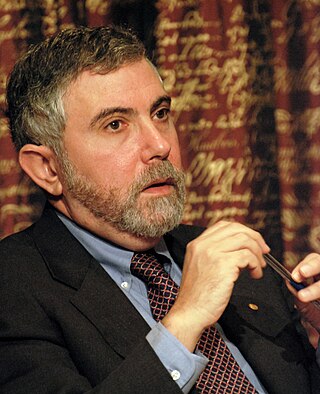
Paul Robin Krugman is an American economist who is the Distinguished Professor of Economics at the Graduate Center of the City University of New York and a columnist for The New York Times. In 2008, Krugman was the winner of the Nobel Memorial Prize in Economic Sciences for his contributions to New Trade Theory and New Economic Geography. The Prize Committee cited Krugman's work explaining the patterns of international trade and the geographic distribution of economic activity, by examining the effects of economies of scale and of consumer preferences for diverse goods and services.
"Vast right-wing conspiracy" is a phrase popularized by a 1995 memo by political opposition researcher Chris Lehane and then referenced in 1998 by the then First Lady of the United States Hillary Rodham Clinton, in defense of her husband, President Bill Clinton, characterizing the continued allegations of scandal against her and her husband, including the Lewinsky scandal, as part of a conspiracy by Clinton's political enemies. The term has been used since, including in a question posed to Bill Clinton in 2009 to describe verbal attacks on Barack Obama during his early presidency. Hillary Clinton mentioned it again during her 2016 presidential campaign.

Willowbrook State School was a state-supported institution for children with intellectual disabilities located in the Willowbrook neighborhood on Staten Island in New York City from 1947 until 1987.
Donald Luskin is Chief Investment Officer for Trend Macrolytics LLC, a consulting firm he founded in 2001, providing investment strategy and macroeconomics forecasting and research for institutional investors. Luskin contributes commentaries on the editorial page of the Wall Street Journal, and appears regularly on Fox Business. He was formerly a CNBC contributor, a contributing editor and columnist for National Review Online (NRO), and a columnist for TheStreet.com. His media commentaries and appearances touch on investing, economic and political matters.
William Harold Greider was an American journalist and author who wrote primarily about economics.
"You Do Something to Me" is a song written by Cole Porter. It is notable in that it was the first number in Porter's first fully integrated-book musical Fifty Million Frenchmen (1929). In the original production, the song was performed by Genevieve Tobin and William Gaxton, performing the roles of Looloo Carroll and Peter Forbes, respectively.

Science Made Stupid: How to Discomprehend the World Around Us is a 1985 book written and illustrated by Tom Weller. The winner of the 1986 Hugo Award for Best Non-Fiction Book, it is a parody of a junior high or high school-level science textbook. Though now out of print, high-resolution scans are available online, as well as an abridged transcription, both of which have been endorsed by Weller. Highlights of the book include a satirical account of the creationism vs. evolution debate and Weller's drawings of fictional prehistoric animals. The style has been compared to Mad magazine.
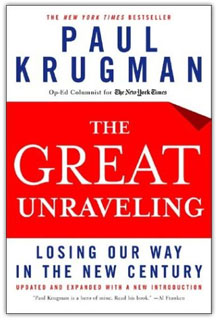
The Great Unraveling: Losing Our Way in the New Century is a book by American economist and Nobel laureate Paul Krugman, consisting of a collection of his columns for The New York Times. The collected columns were concerned mainly with the U.S. economy in the early 2000s, and about the economic and foreign policies of the George W. Bush administration.

Amity Ruth Shlaes is an American conservative author, writer, and columnist. She writes about politics and economics from a classical liberal perspective. Shlaes has authored five books, including three New York Times Bestsellers. She currently chairs the board of trustees of the Calvin Coolidge Presidential Foundation and serves as a Presidential Scholar at The King's College in New York City. She is a recipient of the Bastiat Prize and, more recently, the Bradley Prize.

Russell David "Russ" Roberts is an American economist. He is currently a research fellow at Stanford University's Hoover Institution and president of Shalem College in Jerusalem. He is known for communicating economic ideas in understandable terms as host of the EconTalk podcast.
"Wingnut", wing nut or wing-nut, is a pejorative American political term referring to a person who holds extreme, and often irrational, political views.
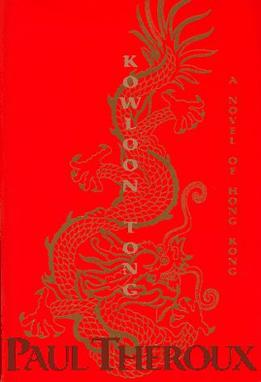
Kowloon Tong (1997) is a novel by Paul Theroux about Neville "Bunt" Mullard, an English mummy's boy born and raised in Hong Kong. The story is set in the days leading up to the handover to China of Hong Kong from the British.

The Conscience of a Liberal is a 2007 book written by economist and Nobel laureate Paul Krugman. It was 24th on the New York Times Best Seller list in November 2007. The title was used originally in Senator Paul Wellstone's book of the same name in 2001. Wellstone's title was a response to Barry Goldwater's 1960 book The Conscience of a Conservative. In the book, Krugman studies the past 80 years of American history in the context of economic inequality. A central theme is the reemergence of both economic and political inequality since the 1970s. Krugman analyzes the causes behind these events and proposes a "new New Deal" for America.

Robin Elizabeth Wells is an American economist. She is the co-author of several economics texts, mostly with her husband Paul Krugman.
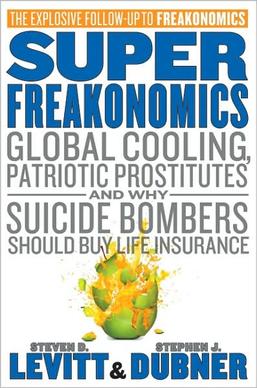
SuperFreakonomics: Global Cooling, Patriotic Prostitutes, and Why Suicide Bombers Should Buy Life Insurance is the second non-fiction book by University of Chicago economist Steven Levitt and The New York Times journalist Stephen J. Dubner, released in early October 2009 in Europe and on October 20, 2009 in the United States. It is a sequel to Freakonomics: A Rogue Economist Explores the Hidden Side of Everything.
The paradox of toil is the economic hypothesis that, under certain conditions, total employment will shrink if there is an increased desire among the population to take on paid work. According to the macroeconomist Gauti Eggertsson, this occurs when "the short-term nominal interest rate is zero and there are deflationary pressures and output contraction". When wages are pushed down by the simultaneous efforts of everyone in the labor force to work more even at lower wages, with interest rates against the zero bound, demand must fall because the only source of added demand would be added credit to compensate for those lower wages, credit which cannot be made available on any looser terms; this loss of demand from lower wages leads to a loss of jobs. The belief that there must necessarily be more work available if wages drop is an example of the fallacy of composition.
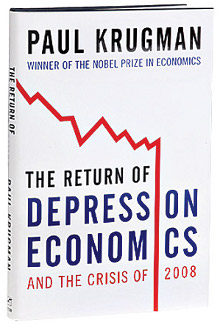
The Return of Depression Economics and the Crisis of 2008 is a non-fiction book by American economist and Nobel Prize winner Paul Krugman, written in response to growing socio-political discourse on the return of economic conditions similar to The Great Depression. The book was first published in 1999 and later updated in 2008 following his Nobel Prize of Economics. The Return of Depression Economics uses Keynesian analysis of past economics crisis, drawing parallels between the 2008 financial crisis and the Great Depression. Krugman challenges orthodox economic notions of restricted government spending, deregulation of markets and the efficient market hypothesis. Krugman offers policy recommendations for the prevention of future financial crises and suggests that policymakers "relearn the lessons our grandfathers were taught by the Great Depression" and prop up spending and enable broader access to credit.

The Republican Brain: The Science of Why They Deny Science — and Reality is a 2012 book about the psychological basis for many Republicans' rejection of mainstream scientific theories, as well as theories of economics and history, by the American journalist Chris Mooney.













